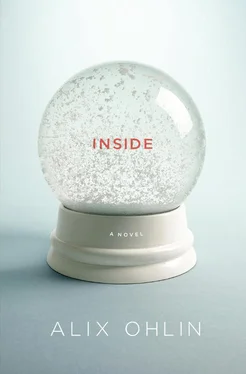She stood there to catch her breath, leg muscles twitching, nose running. Twenty yards away, a fox raced to safety. She turned to Tug, to point it out to him, as if he were there. In that moment, she believed he would always be next to her, always the first person she wanted to tell about any miraculous or ordinary event, always the one whose reactions she sought, always the voice in her ear.
“Tug,” she said out loud. Then she knelt down and washed her face in the snow.
Two weeks later she was standing in the bathroom with a pregnancy test in her hand — the stick’s plus-sign result only confirming the changes she had already detected in her body — when the phone rang. She let it go, not caring. She hardly knew how to react. She’d always planned on it in some general sense; at the start of their marriage, before things went wrong, she and Mitch had discussed it, and once, on a trip out west to see her parents, she couldn’t resist buying, in an upscale craft shop, a tiny, hand-knit purple baby cap. With the divorce and its aftermath any thoughts of parenthood had lost their immediacy, but now added to this month’s turbulence was the idea that she could have a child.
Whoever was calling wouldn’t stop. The phone kept ringing. She put the stick down and went into the living room to answer it.
It was Annie’s mother, hysterical, her voice blurring the words, asking, “How could this be? Where did she go?”
Grace listened, barely able to make sense of what she was saying. Annie had run away, apparently, and left a note saying she was leaving and never coming back, that they shouldn’t try to find her.
“How could she do this?” Annie’s mother demanded.
Grace murmured some vague response, such consolation as she could muster. She was so distracted that she could hardly concentrate.
“I just don’t understand,” Annie’s mother was saying. “People don’t just do this. People don’t just disappear.”
Grace spoke the right words, the comforting words, and they were on the phone for an hour. But throughout the call she was thinking, Yes, they do. People disappear all the time.

Los Angeles, 2003
WHEN ANNE RETURNED from Edinburgh, there were five voice-mail messages from her agent, Julia, each more frantic than the last.
“Darling,” the last message went, “this is big. Call me today or else, I swear to God.”
Anne stood in the hot, dusty apartment, her unpacked bag on the couch. Though most signs of Hilary and Alan had been removed, the place still didn’t feel like hers again. She walked around opening windows, glanced inside the empty fridge, and found a dead potted plant in the bedroom, tucked behind a curtain on the windowsill. Hilary must have bought it.
Besides Julia, she had no one to call to say she was home.
In the early morning, she ran five miles and was back at the apartment, showered and staring at the clock, by seven thirty. Since Julia never got in before ten, she went for a walk around the neighborhood, bought some groceries, and had a manicure. It was a beautiful late-August day, warm but not humid. Tributes were starting to go up, flowers and photographs, notices of ceremonies, everyone seeming a little teary and brave and on edge, the anniversary bearing down. Anne noticed these things only insofar as she wanted to disassociate herself from them. If she could have managed not to register the date at all, she would have. But as it was, she thought about Hilary’s due date and knew that it had passed.
Back at the apartment, she called Julia, whose assistant put her through right away, an unprecedented act.
“Darling girl,” Julia said, “where the fuck have you been?”
“I told you. Scotland, in a play.”
“You and your plays,” Julia said, trying to sound fond, though her disgust was obvious. Julia was about toothpaste commercials, modeling if necessary. She was about getting your face out there. “Fortunately for you, they waited. You must’ve really done a number on that guy.”
The first guy who came to Anne’s mind was Sergio, sprawled on the unforgiving cobblestones, his eyes flashing when he rose up again to hit her, his anger laid bare. Then she refocused and said, “What guy?”
“Michael Linker,” Julia said, as if everybody knew who this was. “He saw you in that godforsaken thing on Long Island.” At the time, Julia had called the godforsaken thing a masterpiece of contemporary drama.
“Whatever,” Anne said.
“Not whatever! He just got promoted to a new studio-exec position and wants you to audition for this pilot that sounds amazing . Gritty family drama, lots of sex. It’s a cable show. You need to be on a plane to Los Angeles today . Call me back with your flight info and I’ll get you a car on both ends.”
Anne had been telling Julia for months that she didn’t want to leave New York, that she wasn’t interested in television, that independent films were the only projects for which she wanted to be considered. Standing in her apartment, the air conditioner wheezing asthmatically, she realized that nobody cared what she wanted.
“Annie,” Julia said. “You’re on this, right?”
“I’m there,” she said.
That night she got on a plane, no longer tracking whether she ought to be asleep or awake. In California the car delivered her to a hotel, where she took a bubble bath, then ordered room service. Outside, the sun glared over a tangled mass of highways. Her interview wasn’t until the next day, and she had hours to enjoy herself on someone else’s money. So she went swimming at the hotel pool, then took another long bath. She remembered Hilary, when she first came to stay, gulping down donuts and any other food in the apartment. In retrospect, her appetite was surely fueled by pregnancy, but she also seemed to believe in eating while the eating was good, like a feral cat. Anne felt the same way about creature comforts. When luxury was available, she would gorge herself.
Then she pulled out the script that had been waiting for her when she checked in. She read it through and started rehearsing her lines. Low expectations or not, she wasn’t going to sabotage herself. She’d work with what she had. She remembered Julia’s parting words. “You may not be the best or the prettiest, but you don’t have to be,” she’d said. “You only need to seduce one person at a time.”
Her appointment was at ten, on a studio lot. When she arrived, two people were waiting — Michael Linker, her fan from the play, and a woman he introduced as Diane. The office was both lavish and uncomfortable, designed to put newcomers at a disadvantage. Michael sat on a white Lucite desk, lounging in jeans and a crisp white shirt. Diane leaned back against a windowsill piled high with scripts. Anne was given an entire white leather couch to herself, into the depths of which she sank gracelessly, looking up at them.
“Thanks so much for coming in,” Michael said.
“Yes, thank you,” Diane echoed, smiling broadly. “We’re so happy you could make the trip. Michael’s been raving about you ever since he got back from the Hamptons, and finally I just couldn’t stand it anymore and told myself, I have to see this girl!”
“You were incredible in that play,” Michael said. “You ruled the stage, and that final scene was, my God, so heartbreaking.”
“And Michael’s not easy to impress,” Diane said. “I hardly ever hear him gush like that.”
This was clearly a lie. It was their job to gush. Anne crossed her legs, trapped in the couch, and kept smiling. “Thanks. You guys are so nice.”
Читать дальше













